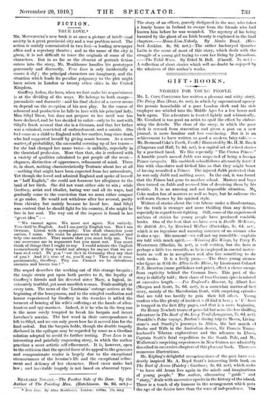FICTION.
TRUE LOVE.*
Ma. MONKTIOUSE'S new book is at once a picture of intellectual society in a great provincial city and a war problem novel. The
action is mainly concentrated in two foci—a leading newspaper office and a repertory theatre ; and as the name of the city is given, it is not difficult to trace the originals of some of the characters. But in so far as the element of portrait fiction
enters into the story, Mr. Monkhouse handles his prototypes generously and discreetly. True Love is only incidentally a roman h clef ; the principal characters are imaginary, and the situation which lends its peculiar poignancy to the plot might
have arisen in London or twenty other cities in the United Kingdom.
Geoffrey Arden, the hero, when we first make his acquaintance is at the dividing of the ways. He belongs to both camps— journalistic and dramatic—and his final choice of a career seems to depend on the reception of his new play. In the course of rehearsal and production he falls in love with his principal lady, Miss Sibyl Drew, but does not propose to her until war has
been declared, and he has decided to enlist—only to he met with Sibyl's frank avowal that she is a German, and that her father was a criminal, convicted of embezzlement, and a suicide. She had come as a child to England with her mother, long since dead, who had supported herself by giving music lessons. As a mere matter,,of probability, the successful covering up of her traces— for she had changed her name twice—is unlikely, especially in the theatrical profession. More than that, she is endowed with a variety of qualities calculated to put people off the scent—
elegance, distinction of appearance, refinement of mind. There is, in short, nothing characteristically Teutonic about her at all —nothing that might have been expected from her antecedents.
Yet though She loved and admired England and spoke of herself as " half English," she could not forswear her allegiance to the land of her birth. She did not want either side to win ; while Geoffrey, artist and idealist, hating war and all its ways, had gradually come to the conviction that we must either conquer or go under. He would not withdraw after her avowal, partly from chivalry but mainly because he loved her. And Sibyl
was content that he should fight for his country, if she might be free in her soul. The way out of the impasse is found in her "great idea" : — We cannot agree. We must not agree. Not entirely. You shall be English. And I am partly English too. But I am German. Listen with sympathy. You shall champion your nation, I mine. We must be generous with one another and help one another. That means that you must help me. You can overcome me in argument but you must not. You must think of things that I ought to say I could admire the Fnglish tremendously if they would not always be say:n1 that we are him and cruel. Dc ycu !.-sovir :hat in Germany they say that of you ? And it's true of us, you'll say ? Then say it com- passionately, Geoffrey. Pity me. Cannot we be chivalrous enemies and lovers too ? "
The sequel describes the working out of this strange bargain ; the tragic strain put upon both parties to it, the loyalty of Geoffrey's friends and his devoted sister Mary, a logical, in- veterately truthful, yet most unselfish woman. Trials multiply at every turn: The news of the Lusitania' outrage arrives at the beginning of the honeymoon, and to the mingled exultation and horror experienced by Geoffrey in the trenches is added the torment of hearing of his wife's sufferings at the hands of alien- hunters and spy-maniacs. Indeed, it is he who in the long run is the more sorely tempted to break his bargain and invert Lovelace's maxim. The last word in their correspondence is left to Sibyl, and we can only guess how far it nerved him for the final ordeal. But the bargain holds, though the double tragedy disclosed in the epilogue may be regarded by some as a Gordian
solution adopted to avoid its further testing. True Love is an interesting and painfully engrossing story, in which the author practises a most artistic self-effacement. It is, however, open
to the criticism that the special force of its appeal to the generous and compassionate reader is largely due to the exceptional circumstances of the heroine's life and the exceptional refine- ment and delicacy of her character. Hard cases make bad law ; and inevitable tragedy is not based on abnormal types.










































 Previous page
Previous page